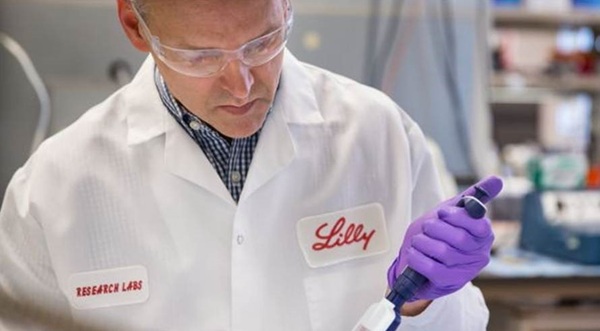
Lilly's Mounjaro (tirzepatide), a GIP/GLP-1 dual
agonist, demonstrated
cardiovascular protection in
landmark head-to-head trial
(ABU DHABI) - Eli Lilly and Company
(NYSE: LLY) announces
topline results from
SURPASS-CVOT, a
first-of-its-kind
head-to-head Phase 3
cardiovascular outcomes
trial comparing two incretin
therapies in adults with
type 2 diabetes and
established atherosclerotic
cardiovascular disease.
Mounjaro (tirzepatide), a
GIP/GLP-1 dual receptor
agonist, was compared to
Trulicity (dulaglutide), a
GLP-1 receptor agonist that
showed a definitive
cardiovascular benefit in
the REWIND study. In
SURPASS-CVOT, Mounjaro
achieved the primary
objective by demonstrating a
non-inferior rate of major
adverse cardiovascular
events (MACE-3), including
cardiovascular death, heart
attack, or stroke, vs.
Trulicity. In addition,
while not controlled for
multiplicity-adjusted type-1
error, Mounjaro showed
improvements on key measures
of A1C, weight, renal
function, and all-cause
mortality. The trial, which
enrolled more than 13,000
participants across 30
countries and lasted more
than four and a half years,
is the largest and longest
study of tirzepatide to
date.
"Cardiovascular
disease remains the leading
cause of death among people
living with type 2
diabetes," said
Kenneth Custer, Ph.D.,
executive vice president and
president, Lilly
Cardiometabolic Health.
"The SURPASS-CVOT results
show that Mounjaro preserved
the cardioprotective benefit
of Trulicity, a GLP-1
receptor agonist, while
providing additional
benefits, including greater
kidney protection and a
reduced overall risk of
death. These findings
strengthen the case for
Mounjaro as a potential
front-line treatment for
people with type 2 diabetes
and cardiovascular disease."
In the trial, the risk
of cardiovascular death,
heart attack, or stroke was
8% lower for Mounjaro vs.
Trulicity (hazard ratio:
0.92; 95.3% CI: 0.83 to
1.01), meeting the
prespecified criteria for
non-inferiority (upper limit
of 95.3% CI of the hazard
ratio < 1.05). Mounjaro
showed consistent results
across all three components
of the MACE-3 composite
endpoint. The rate of
all-cause mortality was 16%
lower for Mounjaro vs.
Trulicity (hazard ratio:
0.84; 95.0% CI: 0.75 to
0.94).
A
pre-specified indirect
comparison analysis of
matched patient-level data
from the REWIND and
SURPASS-CVOT studies found
that Mounjaro reduced the
risk of MACE-3 by 28%
(hazard ratio: 0.72; 95.0%
CI: 0.55 to 0.94) and
all-cause mortality by 39%
(hazard ratio: 0.61; 95.0%
CI: 0.45 to 0.82) compared
to a putative placebo.3,4 In
another key pre-specified
analysis of participants
with high or very-high risk
of chronic kidney disease,
Mounjaro slowed eGFR decline
by 3.54 mL/min/1.73 m2 at 36
months vs. Trulicity (95.0%
CI: 2.57 to 4.50).
In
the trial, Mounjaro also led
to greater improvements in
A1C, weight, and
cardiovascular biomarkers,
including lipids and
systolic blood pressure,
compared to Trulicity. The
safety and tolerability of
Mounjaro and Trulicity were
generally consistent with
their established profiles.
The most commonly reported
adverse events in
SURPASS-CVOT for both
Mounjaro and Trulicity were
gastrointestinal-related,
generally mild to moderate
in severity, and mostly
resolved after dose
escalation was complete.
During the trial, 13.3% of
participants taking Mounjaro
discontinued treatment due
to adverse events, compared
to 10.2% of participants
taking Trulicity.
Detailed results for
SURPASS-CVOT will be
presented at the European
Association for the Study of
Diabetes (EASD) Annual
Meeting 2025 in September
and published in a
peer-reviewed journal. Lilly
plans to submit these data
to global regulatory
authorities by the end of
this year.
About SURPASS-CVOT
SURPASS-CVOT
(Cardiovascular Outcomes
Trial; NCT04255433) was an
event-driven, randomized,
double-blind, parallel group
Phase 3 trial evaluating the
efficacy and safety of
Mounjaro (tirzepatide)
compared with Trulicity
(dulaglutide) in adults with
type 2 diabetes and
established atherosclerotic
cardiovascular disease,
which lasted approximately
five years (with a median
follow-up of four years). In
the trial, 13,299
participants were randomized
1:1 across 640 sites in 30
countries to receive the
maximum tolerated dose (MTD)
of Mounjaro (5 mg, 10 mg, or
15 mg) or Trulicity (1.5
mg), both administered
subcutaneously once weekly.
The primary objective of the
trial was to demonstrate
that Mounjaro provided a
non-inferior reduction in
the risk of major adverse
cardiovascular events
(MACE-3)—a composite of
cardiovascular death, heart
attack, or stroke—compared
to Trulicity. SURPASS-CVOT
utilized MTD of 5 mg, 10 mg,
or 15 mg once weekly. The
starting dose of 2.5 mg
Mounjaro was increased by
2.5 mg every four weeks
until MTD was achieved.
Participants who tolerated
15 mg continued on 15 mg as
their MTD. Participants who
tolerated 10 mg but did not
tolerate 15 mg continued on
10 mg as their MTD, and
participants who tolerated 5
mg but did not tolerate 10
mg continued on 5 mg as
their MTD.
About REWIND (2019)
REWIND
(NCT01394952) was a
multicenter, randomized,
double-blind,
placebo-controlled trial,
published in 2019, designed
to assess the effect of
Trulicity (1.5 mg) compared
to placebo in adults with
type 2 diabetes with and
without established
cardiovascular disease. The
primary cardiovascular
outcome was the first
occurrence of MACE-3.
Secondary outcomes include
each component of the
primary composite
cardiovascular outcome, a
composite clinical
microvascular outcome
comprising retinal or renal
disease, hospitalization for
unstable angina, heart
failure requiring
hospitalization or an urgent
heart failure visit, and
all-cause mortality. In the
trial, 9,901 participants
from 24 countries had a mean
duration of diabetes of 10.5
years and a median baseline
A1C of 7.2%.
Note: The above
information is intended for
healthcare professionals and
education purposes and is
not meant to influence
prescribing practices or
promote one product over
another nor is it a
substitute for professional
medical advice. Consult with
a healthcare professional
for personalized treatment
options.



